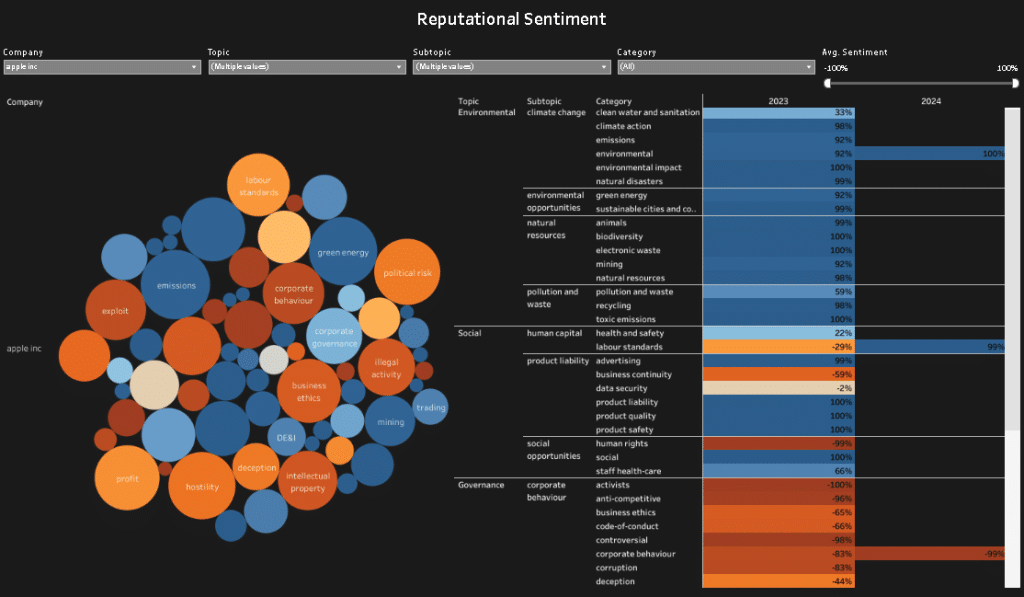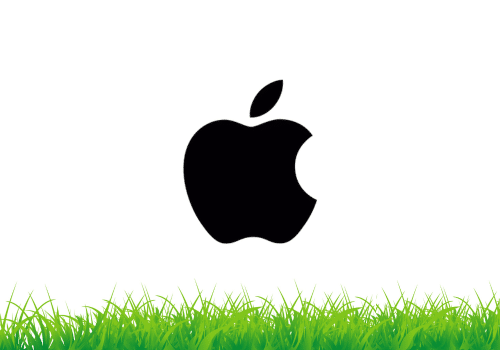ESG scores have become increasingly important in recent years as investors and consumers alike are placing more emphasis on sustainability and corporate responsibility. Apple, one of the leading tech companies in the world, has consistently received high ESG scores, making it a prime example of how a company’s commitment to these values can have a significant impact. In this article, we will explore the Apple ESG score and delve into the ways in which it has influenced the tech industry.
What is Apple’s ESG score and why is it important?
Apple’s ESG score is a measure of the company’s performance in terms of its environmental, social, and governance practices. It takes into account factors such as carbon emissions, waste management, labour practices, diversity and inclusion, board composition, and ethical business conduct. A high ESG score indicates that a company is operating in a sustainable and responsible manner, which can have a positive impact on its reputation, brand image, and ultimately its bottom line. According to our ESG intelligence, the Apple ESG score comes in at 93 for environmental factors, 42 for social factors and 15 for governance factors.


Apple’s commitment to environmental sustainability
Apple has a high environmental score due to the company’s ambitious goals to reduce its carbon footprint, transition to renewable energy sources, and minimize waste. For instance, Apple has made significant progress in reducing the carbon emissions of its supply chain, investing in renewable energy projects, and implementing energy-efficient technologies in its products. By prioritizing sustainability, Apple has not only reduced its environmental impact but has also inspired other companies in the tech industry to follow suit.
Apple’s social impact
The Apple ESG score is lower in social factors attributable to challenges in its vast global supply chain, including labour practices and ethical sourcing, as well as issues concerning data privacy and security. Despite advancements in diversity and inclusion, achieving significant diversity in leadership and technical roles remains a challenge, impacting the social component of its ESG rating.
However, Apple is working towards improving working conditions in its supply chain, promoting diversity and inclusion within its workforce, and supporting education and community development initiatives. For example, Apple’s Supplier Responsibility program ensures that its suppliers adhere to strict labour standards, including fair wages and safe working conditions. This growing commitment to social responsibility is one that must continue to be built on if Apple is to build a positive reputation and attract socially conscious consumers.
Apple’s corporate governance practices
Apple’s low governance score is likely to be a result of several factors, including executive compensation concerns, where high pay levels relative to company performance and broader employee compensation can detract from the score. Additionally, the composition and independence of Apple’s board, including diversity and the presence of independent directors, alongside the mechanisms for shareholder engagement and rights, play critical roles in governance evaluations. Limited shareholder influence on company decisions and perceived deficiencies in board oversight can further negatively affect the governance score.
It is important to note that governance scores can be influenced by the level of transparency and detail in reporting on business practices, supply chain management, and sustainability efforts. Legal and regulatory compliance issues, including any ongoing or past legal challenges, also impact perceptions of governance quality. Despite these challenges, Apple continues to navigate a complex global landscape, striving to improve its governance practices and address stakeholder concerns in an effort to enhance its ESG ratings across the board.
The influence of Apple’s ESG score on the tech industry
Apple’s exemplary ESG score has had a significant influence on the tech industry as a whole. Firstly, it has set a benchmark for other companies in terms of environmental sustainability, social impact, and corporate governance. Many tech companies have taken note of Apple’s success and have started to prioritize ESG factors in their own operations. This has led to a positive ripple effect, with the industry as a whole becoming more conscious of its impact on the environment and society.
How Apple’s ESG score affects consumer perception and purchasing decisions
Apple’s high ESG score has also had a profound impact on consumer perception and purchasing decisions. Today’s consumers are increasingly concerned about the social and environmental implications of the products they buy. By consistently receiving high ESG scores, Apple has positioned itself as a brand that aligns with these values. This has not only attracted socially conscious consumers but has also given Apple a competitive advantage over other tech companies. Consumers are more likely to choose Apple products over alternatives because they see the company as one that shares their values and makes a positive impact on the world.
Comparing Apple’s ESG score to other tech companies
Apple operates in a highly competitive technology market. Here’s a general overview of how Apple might compare to some of its main competitors based on common ESG criteria:
Environmental Practices: Apple has been recognized for its strong commitment to environmental sustainability, including efforts to reduce carbon emissions, use renewable energy across its operations, and improve the energy efficiency of its products. Competitors like Samsung and Google also have significant initiatives in place for environmental sustainability, but Apple’s ambitious goals, such as becoming carbon neutral across its entire business by 2030, set a high benchmark in the tech industry.
Social Responsibility: Apple’s social initiatives focus on privacy, equity, and education, including substantial investments in coding and education programs. However, it faces challenges related to labour practices and supply chain management. Competitors such as Google and Microsoft also emphasize social responsibility, with initiatives supporting digital inclusion and ethical supply chains. The social scores can vary based on how each company’s labour practices, data privacy, and community engagement are evaluated.
Governance: Apple’s governance practices are scrutinized for executive compensation, board diversity, and shareholder rights, similar to its peers. Companies like Microsoft and Amazon are also evaluated on these criteria, with governance scores influenced by factors such as transparency, ethical business practices, and compliance with regulations. Differences in governance scores among these companies often reflect their corporate structures, policies, and transparency levels.
While Apple generally scores well in ESG metrics, especially on environmental initiatives, its competitors also have strong ESG commitments and performance in various areas. The exact comparison of ESG scores can vary over time and depending on the rating agency, reflecting the ongoing efforts by all these companies to address ESG concerns and improve their practices.
Apple ESG score: summing up
Apple’s journey in the realms of environmental sustainability, social impact, and corporate governance paints a vivid picture of a tech giant striving to lead by example in the ESG domain. With a commendable environmental score driven by ambitious sustainability goals, Apple has not only minimized its carbon footprint but has also set a benchmark for the industry. Despite facing challenges in social and governance aspects, particularly concerning supply chain practices, data privacy, and executive compensation, the company is actively working to enhance its standings. Initiatives like the Supplier Responsibility program underline Apple’s commitment to improving working conditions and promoting fair labour practices.
The broader impact of Apple’s ESG efforts extends well beyond its own operations, influencing both the tech industry at large and consumer perceptions. By setting high ESG standards, Apple has catalysed a shift towards more sustainable and responsible business practices among its peers. For consumers, Apple’s strong ESG score translates into a brand that resonates with their values of sustainability and ethical responsibility, influencing purchasing decisions. Similarly, investors increasingly factor in ESG scores, with Apple attracting those prioritising social and environmental considerations. As the tech industry continues to evolve, Apple’s ongoing commitment to ESG excellence remains a critical part of its identity, underscoring the integral role of sustainability and ethical practices in shaping the future of technology.
Find out more
Are you looking for more granular data on Nestle’s ESG practices?
